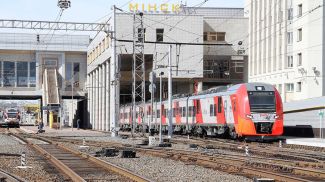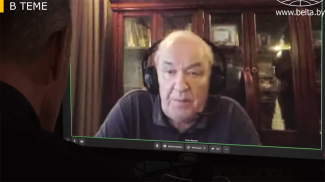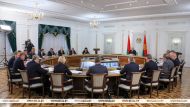MINSK, 22 June (BelTA) – Chair of the Council of the Republic of the National Assembly Natalya Kochanova, members of the Presidium, Secretariat employees, senators, youth parliamentarians, as well as residents of Tsentralny District of Minsk laid flowers at the Masyukovshchina Memorial Complex on 22 June, BelTA has learned.
“For me, this date is always mournful, as for any normal person who remembers the horrible tragedy that happened many years ago. It is impossible to forget it. A war is the most terrible thing that can ever happen,” Natalya Kochanova said.
According to her, much has been done in Belarus to perpetuate the memory of those who sacrificed their lives to defend freedom and independence, those who were tortured in concentration camps. “Almost every piece of our land bears the memory of those who died during the Great Patriotic War. Last year some forgot about it, but we could not betray those people who fought for freedom and independence. We will do everything we can to preserve peace in our country. Our task is to pass the truth about that war from generation to generation. And we should do everything for peace and calm on our land, so that people give birth to children and their children grow up and live a fulfilling life instead of dying or being tortured,” the speaker noted.
Natalya Kochanova emphasized that unfortunately many politicians abroad have recently forgotten the lessons of history. “Therefore, MPs, members of the Council of the Republic call upon the world community to stop this madness against our country. We are descendants of those who died for our native country, and we will never let this happen again on our land,” she stated.
“Today marks the 80th anniversary of the beginning of the Great Patriotic War, and in no way should we underestimate this tragic event. More than 3 million Belarusians died in that terrible war. Today we have honored their memory with a minute of silence. Why this particular place? It was one of the largest concentration camps, where more than 80,000 prisoners of war died. The preservation of historical memory is a duty for all of us: our parents, teachers, society and MPs. In this regard, scholars do a lot. Today the National Academy of Sciences of Belarus publishes a lot of works about the history of the Great Patriotic War.
The most important thing is that we let no one falsify history. Together with our colleagues, Russian scholars, we have issued a unique reference book for school students in the post-Soviet space. Why is this so important? We know that not all of our neighbors - the countries that were participants in that war - want to keep this memory as it really was. It is of utmost importance for young people to remember that. We need to know the lessons of history and we need to learn them so that they will not happen again in the future,” said member of the Council of the Republic, Chief Scientific Secretary of the National Academy of Sciences of Belarus Andrei Ivanets.
Vladislav Rybchik, a member of the Youth Parliament at the National Assembly, is confident that the younger generation should not allow distorting the history. “Today they are trying to manipulate young people, to tarnish this historical memory,” he said. “We have discussion platforms about the history of the war, hold meetings with students of educational institutions. When someone has questions during a discussion, we go back to basics and start to look into things. Young people need to know the truth about the war,” he said
The Masyukovshchina Memorial Complex commemorates prisoners of war and civilians killed in Stalag-352, one of the biggest POW camps in the Nazi-occupied territory of the Soviet Union during the Great Patriotic War. The prisoners were subject to brutal torture and inhumane treatment here. People were held in barracks, barns and stalls. The camp was overcrowded, therefore, especially in the autumn of 1941 and the winter of 1941-1942, many prisoners had to live in the open where they died of exposure, starvation and diseases. Over 80,000 captive soldiers and officers as well as civilians driven from Minsk and surrounding villages were killed in Stalag-352 from July 1941 to 3 July 1944. From December 1943 to June 1944, the Nazis also held here Italian soldiers and officers who fought on the side of the Soviet Union.
The memorial is located in a small pine park. A set of steps leads to the granite monument, and the Eternal Flame is lit in memory of the victims. The grounds of the memorial also include mass graves marked by black marble slabs. A white rotunda displaying the Book of Memory stands in the middle of the park. The Book of Memory includes around 10,000 names of former prisoners of Stalag-352. However, names of over 70,000 victims of the camp are still unknown.













